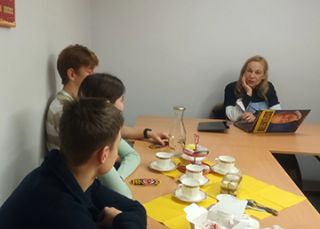Friends
Attending School in a War Zone
Students in Kyiv ask for classes to continue even during rocket attacks.
Posted December 27, 2022 Reviewed by Hara Estroff Marano
Key points
- Students at a Kyiv school endured 40 rocket attacks on their city in one day.
- Classes were held in the school bomb shelter.
- Although a teacher brought games to distract from the danger, the students demanded to go through with their physics class.
- "We wil be needed to help rebuild our country."
The Indeversal School sits on the outskirts of Kyiv in Ukraine. On the morning of December 17th, the Russians launched 40 rockets aimed at Kyiv. What was it like for the school’s 90 in-person students, along with its 130 online students?
Getting to School Was a Problem
Only half of the in-person students managed to reach the school that day. Those who were coming by subway ended up trapped underground. A direct hit on one of the power stations meant no electricity, and the subways couldn’t function. The students were underground, in the dark, not sure when the power might return.
Others had a different reason for not making it to school that day. Police closed the major bridges crossing the Dnipro River. Police know that important bridges are prime targets for Russian rockets, and therefore the police want to make sure there’s no traffic on the bridges in case a rocket hits one of the bridges.
Bomb Shelters

The students and teachers who did manage to reach the school, congregated in the school’s underground bomb shelter, protected from the danger of not only of shattering glass but shrapnel.
Large enough to accommodate all the school’s students and faculty, the school's bomb shelter is arranged in classrooms to come close to replicating the above above-ground school experience.
The shelter has its own generator, and, unlike much of Kyiv, the area had light and heat. Nevertheless, the online students were unable to participate because the Internet was down.
Studying During Rocket Attacks
Teacher Anna Karpenko (not her real name) had a poignant experience that day. “When I went downstairs to the room in the bomb shelter where my class was meeting,” Karpenko recalls, “I had my arms full of games for my 9th and 10th grade physics students. I brought the games to help distract them from the fact that their city was being bombed.”
The students told her, “We don’t want to play games. We need to learn physics. We need to learn what will make us useful to our country when the war is over.”
Several of the students were also eager to talk about what it’s like to attend school during a war. They all spoke English.
Max, whose favorite subject is math, said, “My friends and I don’t want the war to dominate our lives. But still it’s really difficult to study when you have to wait until the light comes on to do your homework.”
Max explained that electricity is rationed, and different parts of the city may get electricity for an hour or so. “I would like to be doing my homework from 6:00 pm to 9:00 pm, but if the light doesn’t come on until 10:00 pm, that’s when I do homework. I have to cram three hours of homework into one hour. Normally I’m in bed by 10:00 pm, but 10:00 pm is when I end up starting my homework.”
Teekhon, a 12-year-old student, talked about how disruptive the air raids are. “You have to run downstairs to the school bomb shelter, and there might be 30 people in one room. Sometimes it can be so dark that I can’t even see my homework. We aren’t able to do what we’re here for.”
Teekhon and his family may have to leave Kyiv because so much of the city’s infrastructure is disabled. The city is struggling with no heat, and at best, only a few hours of light or running water. “I don’t want to leave Kyiv because it’s my home, my life, it’s where my friends are, and we’re all afraid that if we leave, we’ll never come back.”
A young woman, also 12, said, “It’s hard to focus but we all know we need to study because our generation will be needed to help rebuild our country. It’s really hard, but we do it.”
Another young woman had a message for students in the West: “Cherish what you have, because you have opportunities to study that we wish we had.”
References


